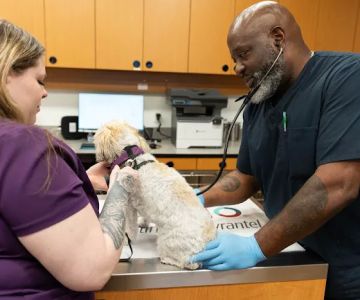How to Prevent Heartworm Disease in Pets
As pet owners, one of our most important responsibilities is ensuring the health and well-being of our beloved animals. One of the most common and serious diseases that can affect both cats and dogs is heartworm disease. This potentially life-threatening condition is caused by parasitic worms that infect the heart and lungs, leading to severe health issues if left untreated. Fortunately, heartworm disease is preventable with the right care and attention. In this article, I’ll guide you through everything you need to know about preventing heartworm disease in your pets, including key prevention methods and how to ensure your furry friend stays safe and healthy.
1. Understanding Heartworm Disease in Pets
Before diving into prevention methods, it's essential to understand what heartworm disease is and how it affects your pet. Heartworm disease is caused by Dirofilaria immitis, a parasitic worm that is transmitted through mosquito bites. When an infected mosquito bites your pet, the larvae of the worm enter the bloodstream, eventually migrating to the heart and lungs. Over time, the worms can grow up to 12 inches long and cause serious damage to the organs, leading to symptoms like coughing, fatigue, difficulty breathing, and in severe cases, heart failure or death.
Heartworm disease primarily affects dogs, but cats can also contract the disease, although it is less common. Unlike dogs, heartworm disease in cats can be more difficult to detect, as the symptoms may not be as obvious. Therefore, both cats and dogs should be regularly tested for heartworms, and preventive measures should be taken for all pets at risk.
2. Why Prevention is Key
Heartworm disease is costly to treat and can be extremely dangerous for your pet. The treatment involves administering medications to kill the adult worms, which can be both expensive and risky for your pet’s health. Preventing heartworms is much easier and less costly than treating the disease after it has developed. By ensuring your pet receives regular preventive care, you can avoid the need for treatment altogether.
Fortunately, heartworm prevention is easy to incorporate into your pet's routine and can save both time and money in the long run. Preventive medications, including oral pills, topical treatments, and injectable options, are widely available and effective in keeping your pet safe from heartworm disease.
3. Heartworm Prevention Medications
The most effective way to prevent heartworm disease in pets is by giving them heartworm prevention medications. These medications are available in several forms, each with its own set of benefits:
- Oral Medications: These are commonly prescribed by veterinarians and need to be given once a month. They come in the form of chewable tablets that your pet can easily consume. Popular oral heartworm preventatives include ivermectin and milbemycin oxime.
- Topical Treatments: Applied directly to the skin, these preventatives are typically used once a month. They are a great option for pets who may be difficult to give oral medication to. Examples of topical treatments include Advantage Multi and Revolution.
- Injectable Medications: These are given by a veterinarian and can provide heartworm protection for up to six months. An example is ProHeart 6, which offers long-lasting protection against heartworms and other parasites.
It's important to consult with your veterinarian to determine the best preventive option for your pet based on their age, breed, and lifestyle. Additionally, heartworm medications should be given year-round, even in areas where mosquitoes may not be as prevalent during the winter months. This ensures continuous protection for your pet.
4. Regular Testing and Veterinary Check-ups
In addition to regular use of heartworm prevention medications, it's essential to have your pet tested for heartworms annually. Even if you have been consistent with your pet’s preventive care, there is always a small chance of exposure to heartworm larvae. Regular testing helps detect any potential infection early, before it becomes a serious issue.
Testing is simple and involves a blood test that looks for heartworm antigens or microfilariae in your pet’s bloodstream. Early detection is critical because treatment is much more effective when the disease is caught in its early stages. This is especially important for pets that live in regions with high mosquito activity, such as warmer climates.
5. Other Ways to Minimize Risk
While using heartworm prevention medications and getting regular tests are the most effective ways to protect your pet, there are other steps you can take to minimize the risk of heartworm disease:
- Keep your pet indoors during peak mosquito hours: Mosquitoes are most active during dawn and dusk, so keeping your pet indoors during these times can help reduce their exposure to mosquitoes.
- Eliminate standing water: Mosquitoes breed in stagnant water. Make sure to eliminate any standing water around your home, such as in flower pots, bird baths, and clogged gutters, to reduce the mosquito population.
- Use mosquito repellents: Some pet-safe mosquito repellents are available and can help protect your pet from mosquito bites. Always consult with your veterinarian before using any repellent on your pet.
6. The Importance of Preventive Care for Your Pet’s Health
Heartworm disease is just one of many health conditions that can affect your pet, but with the right preventive measures, you can help your pet lead a long and healthy life. Just like with any other medical condition, prevention is the key to minimizing risks and avoiding costly treatments. By incorporating heartworm prevention into your pet's routine, you're ensuring they have the best chance for a healthy, happy life.
If you're ever unsure about which heartworm prevention method is best for your pet, consult with a trusted veterinarian at Hidden Brook Veterinary. They can help you select the right treatment, provide expert advice on maintaining your pet’s health, and answer any questions you may have.











